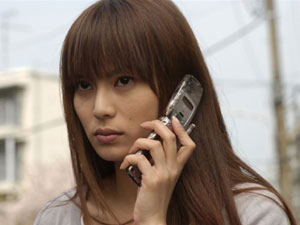|
|
|
|
|
|
|
|
One
Missed Call |
|
|
|
Year: |
2003 |

Kou Shibasaki |
|
|
Director: |
Takashi
Miike |
|
|
Cast: |
Kou Shibasaki, Shinichi Tsutsumi, Kazue Fukiishi, Atsushi
Ida, Anna Nagata, Mariko Tsusui |
|
|
The
Skinny: |
Cult
favorite Takashi Miike takes a stab at J-Horror with
the box office hit One Missed Call, a film that
sets out in graphic fashion to prove that cell phones
really are hazardous to your health. Although highly
derivative of other Asian horror favorites, the film
is saved by its lead actress and a strong final act.
The film does manage to entertain at times, but it's
still all the same stuff we've seen before. As with
films of this sort, your mileage will vary. |
|
|
Review by
Calvin
McMillin: |
Takashi
Miike, known for such genuinely disturbing films as
Audition and Ichi the Killer, tries his
hand at more straightforward frights with One Missed
Call, a by-the-numbers horror flick that takes the
tried-and-true formula established by Hideo Nakata's
Ring, substituting that film's infamous VHS tape
with an equally destructive cell phone message. Cell
phone owners with plenty of "anytime minutes"
are duly warned.
One Missed Call
revolves around Yumi Nakamura (Go's Kou Shibasaki),
whose college buddies are suddenly dropping like flies,
one by one. The trouble begins when her friend Yoko
(Anna Nagata) gets a puzzling message left on her cell
phone, followed by a bloodcurdling scream. But that's
not the end of the weirdness because 1) when the call
came, the ringtone changed into a spooky song, 2) the
call came from her own phone, 3) it was placed some
seventy-two hours in the future, and 4) both the voice
and scream on the message belong to Yoko. Clearly, nothing
good can come from this.
Seventy-two hours later,
bad things do happen to poor Yoko, and that tragedy
is soon followed by the untimely demise of one of Yumi's
other friends, Kenji (Atsushi Isa), under eerily similar
circumstances. Next up in the wheel of misfortune is
Yumi's best gal pal, Natsumi (Kazue Fukiishi). But this
time around, the press has gotten wind of the "killer
cell phone call" connection and turned Natsumi's
date with destiny into a ratings stunt, asking her to
appear on a live television broadcast as the deadline
fast approaches. Feeling that it might be the key to
her safety, she agrees.
Meanwhile, Yumi enlists
the help of Yamashita (Shinichi Tsutsumi), whose sister
was one of the first victims of this curse, and together
they search for clues that might save Natsumi. Their
quest leads them to an orphanage, an abandoned hospital,
and several other places. Eventually, all roads lead
to a girl who died under dubious circumstances. Will
they be able to save Natsumi and themselves in time
or will they all succumb to the killer ringtone of doom?
Answers (of a sort, anyway) are given, but to reveal
that here would spoil what little fun One Missed
Call has to offer.
Many Miike apologists
have claimed that the film is alternatively a brilliant
satire and/or parody of the recent wave of Asian horror
films, but that seems to be a disingenuous justification
for what clearly seems to be a work-for-hire project.
As a satire, there's really nothing socially or culturally
relevant to ridicule here, aside from maybe the over-reliance
on cell phones in today's world. But to say the film
contains that kind of overt cultural commentary feels
like a stretch. And as a parody, well, One Missed
Call's propensity for aping scenes almost shot-for-shot
from other movies doesn't constitute parody, especially
when there doesn't seem to be the slightest inkling
of any comic intent, except maybe the severed hand that
ends up dialing a number - that was funny, intentional
or not. Ultimately, Takashi Miike just cashes a paycheck
with One Missed Call, a slick commercial horror
film sure to deliver the requisite amounts of chills
the genre requires, but gives little else in the way
of innovation.
To the film's credit,
the TV station segment turns out to be a standout sequence
in the movie, one that is strongly reminiscent of the
old EC comics like Tales from the Crypt and The
Vault of Horror. In this subplot, One Missed
Call takes the rumor-mongering aspect that surrounds
J-horror films and puts it into a public forum. The
film takes what usually is conventionally confined to
the level of an underground urban legend and makes it
go mainstream within the narrative itself.
The final third of the
film proves to be its strongest act, especially the
scenes in the abandoned hospital. There's a mystery
to be solved here, and the momentum helps carry those
scenes, even if it all does feel a bit derivative of
earlier, better works. Miike's touch can be seen in
the film's fakeout ending, which is soon followed by
the real one, a head-scratchingly obtuse zinger that
proves to be oddly-satisfying, if for no other reason
than it deviates from convention.
If you're looking for
a great Asian horror film, One Missed Call isn't
that film. It is, however, somewhat of a "greatest
hits" package of horror conventions, which may
or may not appeal to genre fans. Ultimately, if you're
a fan of Takashi Miike, Kou Shibasaki (who delivers
a fine performance as Yumi), or horror movies in general,
you could do far worse than watching One Missed Call.
Believe me, I know. (Calvin McMillin, 2005) |
|
|
Availability: |
DVD (USA)
Region 1 NTSC
Media Blasters/Tokyo Shock
Double Disc Special Edition
16 x 9 Anamorphic Widescreen
Japanese and English Dubbed Language Track
Dolby Digital 5.1
Removable English Subtitles
"Making of" Documentary, Interviews, Alternate
Ending, Trailers, and more
|
|
|
|
 |
|
|
|
|
|
|
|
|
|
|
|
|
|
|
|
|
| LoveHKFilm.com
Copyright ©2002-2017 Ross Chen
|
|
|